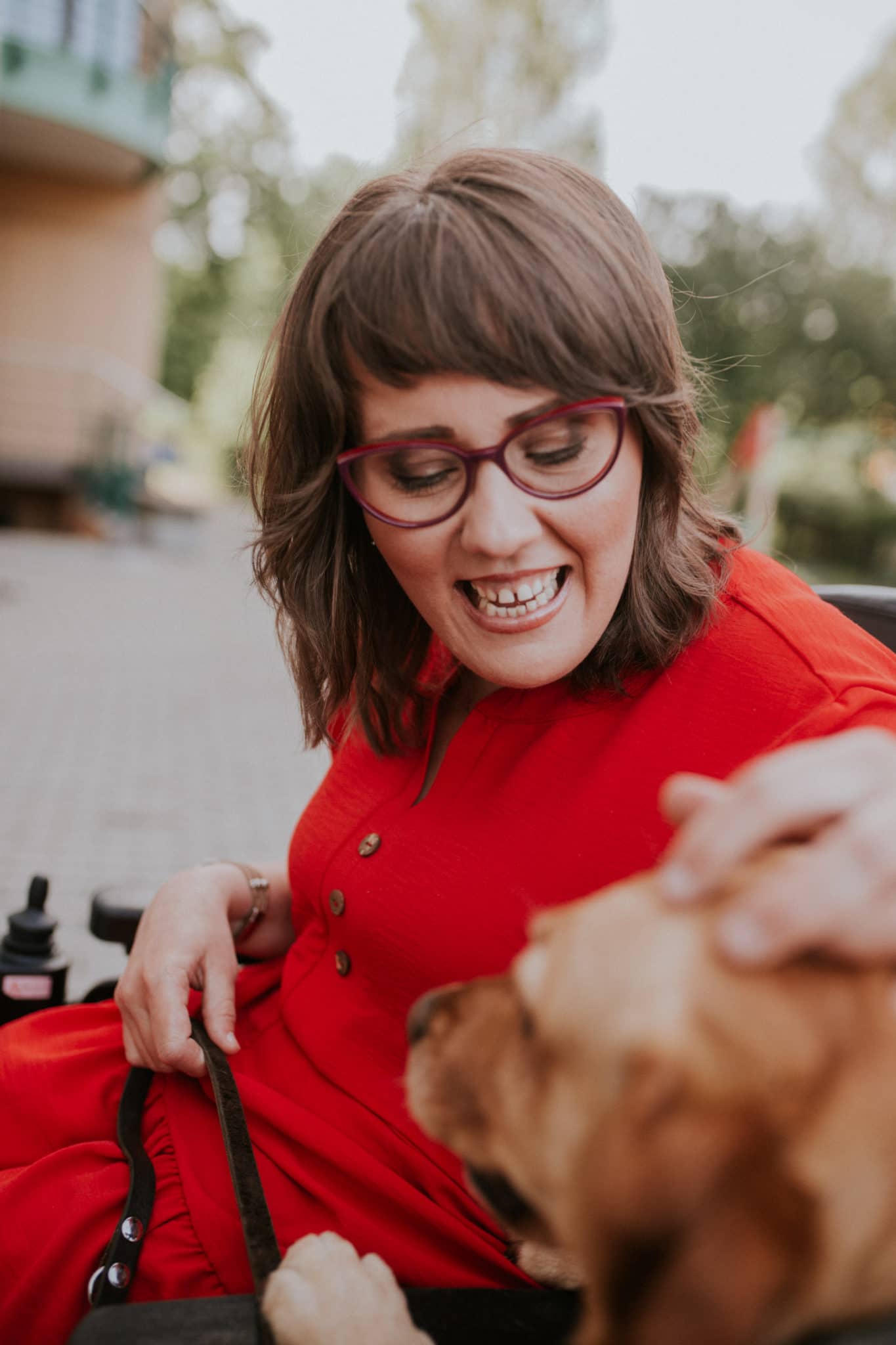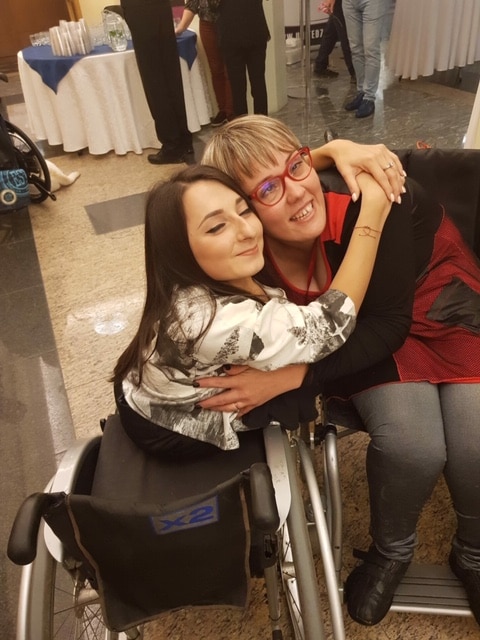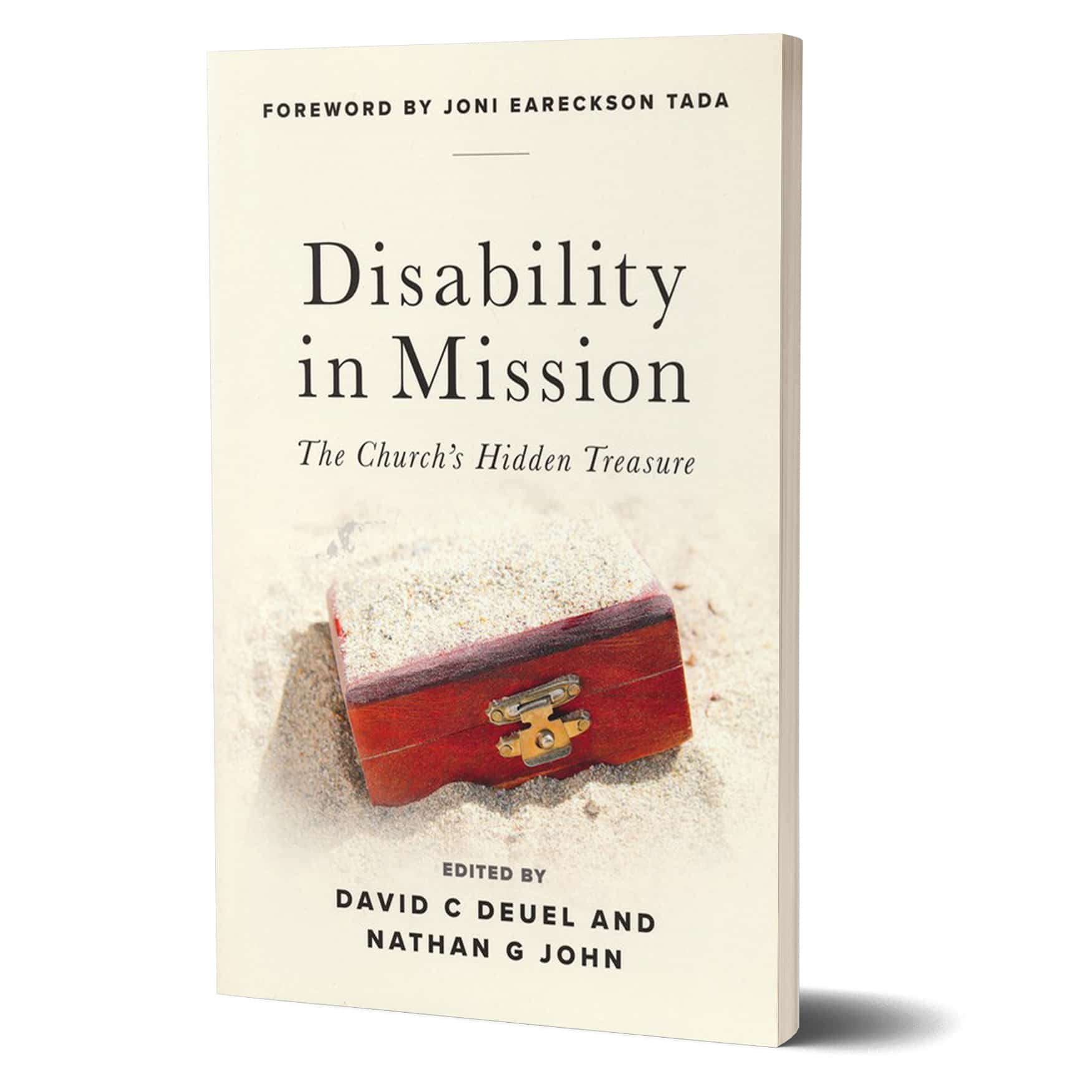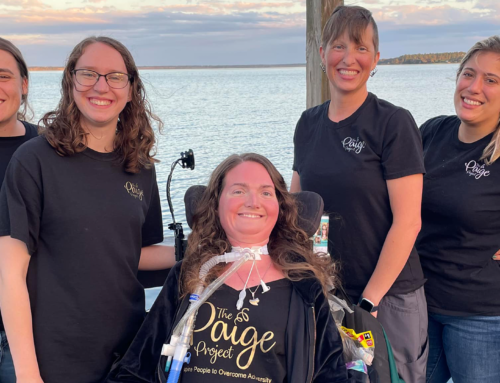Wheelchairs on Mission
Feeling like nothing

I remember very well what my mom told me others were telling her—that nothing good would ever come from me, that it was not worth it to bring me to the school just for me to sit there and listen. I got sick when I was a year and a half old. The doctors told my parents to leave me at the hospital because I would never be anything. But my parents were brave, and they didn’t do it. For that, I will always be grateful!
At school there were many too who said, “You will never be anything”. I especially remember one boy from elementary school who laughed at the way I looked and walked, and also at my wheelchair. Because of him I had days when I didn’t want to go to school. Even though I didn’t know to whom, I would pray that our car would break down so that my mom couldn’t bring me to school. Occasionally my prayers were answered. Those were happy days, because I didn’t need to hear the teasing. I liked to learn, but it was painful to hear others laughing at me, even though I told my parents (and myself) that I was strong, and the laughing didn’t matter. But it did matter.
The feeling that I was nothing only continued to grow.
After graduating from high school, I went straight to university. I was a good student. That was the way my parents and I could prove to the world that I was like everyone else—I could be in a wheelchair and still study successfully.
But the feeling that I would never be anything didn’t go away.
I studied hard because I wanted to suppress this feeling and prove to the world that I could do anything. But even though I looked strong on the outside, I was actually very weak on the inside. I felt completely lost. I hated myself, I hated my disability, and I didn’t want to be different from others. I so badly wanted to fit in, but I didn’t. I tried so hard to be like others—I lost weight, started smoking and drinking, and became as independent as I could. I started to put my value in my independence. But instead of fitting in, I became more and more lonely with each passing day.
Jesus changes everything
Not long after starting at the university, I met a guy who began asking me questions about the meaning of life and my beliefs. At that point I was not sure what I believed in, if anything at all. Then he told me about Christ and brought me to church. The pastor talked about a God who accepts me unconditionally. It touched my heart deeply. I understood that God loved me for the person I was, that He died because of my sins and paid the penalty in my place not because I had achieved anything, but simply because I was His child and precious in His eyes . . . just the way I was. I discovered a passage in the Bible: Psalm 139: 13 – 14 says, “For you created my inmost being; you knit me together in my mother’s womb” and in John 3:16, “For God so loved the world that he gave his one and only Son, that whoever believes in him shall not perish but have eternal life.” I cried from happiness! Finally, somebody accepted me as I was, and I didn’t have to prove anything to Him!
On the outside nothing big changed. However, my attitude was completely different. I started to enjoy my life, my studies, and myself. I grew spiritually. I realized that my journey had gone from “You will never be anything” to “You are already loved and valuable to God’s mission”. But I wanted more. I wanted to be part of a church where I could give, not just receive. And I wanted to be open about my faith at my university. God honored these desires in special ways.
Discovering my calling and gift
I met missionaries from Cru (formerly Campus Crusade for Christ) who saw me first, not my disability. They saw that I had something to offer the students around me and challenged me to make Jesus known at my university. I was told that I would not be treated any differently in Cru because I had a disability. With their help, I started a Cru group on campus. I gathered other Christians and we met weekly to study the Bible, pray, and go out to initiate conversations about God with other students. As a young Christian, it was sometimes scary, but I always loved doing it. I saw how God could use me, not in spite of my disability, but because of it. Students were willing to listen to me. I could share the gospel and get students thinking about God.
With the Lord my wheelchair became my microphone.
And then I found a church that didn’t want to heal me but instead gave me opportunities to serve. That is what people with disabilities want more than anything. We want opportunities to give, to be valued as church members and co-laborers in God’s kingdom work, and to be accepted as we are.
If a person with a disability is only viewed as an object for healing, then that communicates that he or she is not valuable as they are and that they need to be healed before they can give.
The first time I met the pastor of the church I currently attend, I asked him, “What can I give to the church?” He didn’t hesitate to answer.
Ministry opportunities in my church change my life
First, he asked me to start by writing the church newsletter. Before long, he had me leading a church small group. Now, I lead a group through a program called the Alpha Course. He also supports me by doing disability Sundays at our church. The way these commitments have all come about, I expect there will be more.

My pastor and the church have helped me find my identity as a follower of Christ and one who does not only receive but also gives. After graduating I joined staff with Cru and worked among students for five years. I saw God use me in many ways, but most significantly in the life of a student named Diana. I met her one day at the university café. I shared the gospel with her, and she accepted Christ as her Savior right there in the café! We started to study the Bible together. We also became good friends and our common disability experience allowed me to help her to grow both as a follower of Christ and as a healthy and independent person.
As she herself said, she finally had someone to look to as an example.
Even now that makes me wonder how I could ever want to get rid of something like my disability that the Lord uses in great ways to bring others to Him. True, sometimes Diana and I find that our disability experience is not easy. But we recognize that our common experience gave us also a common language that the Lord used to bring Diana to Himself. Diana and I serve the Lord in our wheelchairs on mission.
A deepening commitment to service
My own experience with Diana, as well as with a Christian camp for people with disabilities, convinced me that I needed to share my relationship with Christ further to other people with disabilities. Because of my personal experience with how the Lord found me and enabled me to live for Him, He put on my heart the desire to start a ministry called the Ability Movement.
The Ability Movement is born
The mission of the Ability Movement is to “Include people with disabilities in society and Christian environments by giving them opportunities to get to know Christ, to become His disciples, and to live and labor for His glory by sharing the Good News and bringing hope, and in this way helping overcome prejudices against disability in society.” This mission is based upon Christ’s Great Commission in Matthew 28:18–20, from which people with disabilities are not excluded.
We live out our mission by:
- Winning – speaking individually to people with disabilities about Christ and organizing seeker-friendly Bible studies and fellowship times.
- Building – providing opportunities for people with disabilities to grow in their faith through individual discipleship meetings and group Bible studies. In addition, we have an Ability Movement Facebook page where we post short articles to educate readers on different disability issues, including humorous ones, as well as giving them the opportunity to grow in following Christ.
- Sending – enabling people with disabilities to do missions by giving opportunities to lead Bible studies, speak to others about their faith, and serve in a church. We promote church accessibility by speaking to churches and regularly organizing inclusive services where we promote inclusion of people with disabilities in church.
God works in hearts
As a missionary with Cru through the Ability Movement I need to develop my ministry partner team. I love this process because I see how God is using it to build a volunteer team that is ready to help by giving financially, praying for the ministry and me, and also by giving their time to the Ability Movement. I believe that to fulfill the Great Commission we need all Christians, both with and without disabilities. My team leader has said:
“As a ministry leader I am not looking at someone with a disability and thinking, ‘How can I find place for this person to fit in?’ I am thinking, ‘How can I mobilize this person to action?’ I don’t see a disability, I see a potential laborer. Because the Great Commission is so big that it takes all Christians to help fulfil it.”
Rebecca Arvan, Cru National Director in Latvia
This echoes my heart. And I invite all Christian leaders to consider it too.
Written By—Baiba Baikovska
Baiba Baikovska is leader of Ability movement within “Agape Latvia” (Cru in Latvia) and PhD student at Riga Stradins university.
Edited by David C. Deuel & Nathan G. John
Disability in Mission
Disability in Mission: The Church’s Hidden Treasure outlines a radical change in approaches to missiology, missions, and praxis for the twenty-first-century global cultural context. It explores a pattern whereby God works powerfully in missions through disability and not in spite of it.








